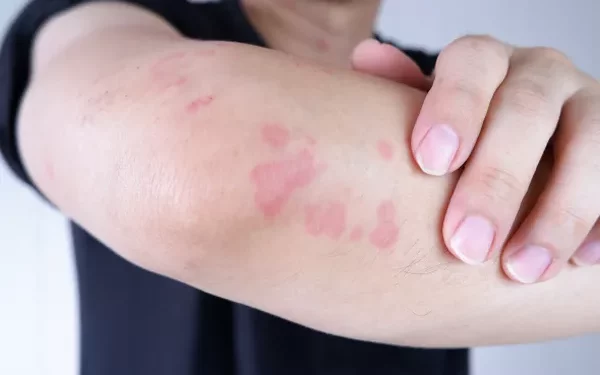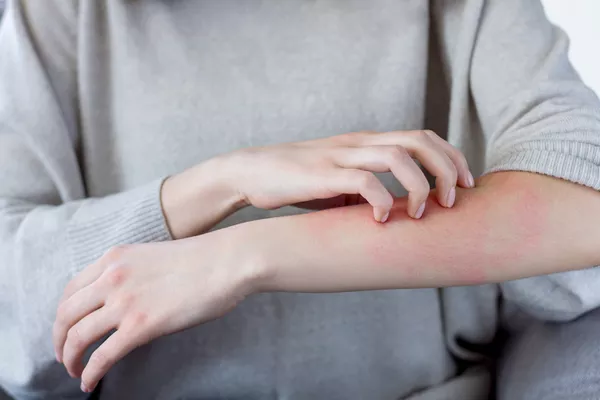Hives, medically known as urticaria, are a common skin condition characterized by raised, red, and itchy welts on the skin. They can appear suddenly and often disappear within a few hours or days. While hives themselves are usually harmless and temporary, identifying their underlying causes can be crucial for effective management and prevention. In this article, we delve into the diverse array of triggers that can prompt the onset of hives, providing insight into their origins and implications.
What are Hives?
Before delving into the triggers of hives, it is essential to grasp the nature of the condition itself. Hives manifest as swollen, pale-red bumps or plaques on the skin, often accompanied by itching, burning, or stinging sensations. These welts can vary in size and shape and may merge together to form larger areas of raised skin. While hives can occur anywhere on the body, they typically develop on the chest, back, or face.
Hives result from the release of histamine and other chemicals from specialized cells in the skin called mast cells. These substances cause blood vessels to leak fluid into the surrounding tissues, leading to the characteristic swelling and redness associated with hives. Various factors can trigger this immune response, ranging from allergic reactions to underlying medical conditions and environmental influences.
Allergic Triggers
One of the most common causes of hives is allergic reactions to certain substances. These allergens can be ingested, inhaled, or come into direct contact with the skin. Foods such as nuts, shellfish, eggs, and dairy products are notorious culprits, along with food additives and preservatives. Insect stings or bites, medications like antibiotics and nonsteroidal anti-inflammatory drugs (NSAIDs), and latex can also trigger allergic hives in susceptible individuals.
Allergic hives typically develop shortly after exposure to the allergen and may be accompanied by other symptoms such as swelling of the lips, tongue, or throat, difficulty breathing, and abdominal pain. Identifying and avoiding the specific allergen is essential in preventing recurrent episodes of hives in these cases.
Non-Allergic Triggers
While allergies are a prominent trigger for hives, numerous non-allergic factors can also contribute to their development. These triggers include:
1. Stress: Emotional stress can stimulate the release of stress hormones like cortisol, which in turn can activate the immune system and trigger hives.
2. Infections: Viral or bacterial infections, particularly those affecting the respiratory or gastrointestinal tracts, can provoke an immune response leading to hives.
3. Temperature Changes: Exposure to extreme temperatures, such as hot showers, cold weather, or sudden changes in temperature, can induce hives in some individuals.
4. Physical Pressure: Pressure on the skin caused by tight clothing, belts, or prolonged sitting or standing can lead to a type of hives known as dermatographism or pressure urticaria.
5. Exercise: Vigorous physical activity can cause hives in some people, a condition referred to as exercise-induced urticaria. The exact mechanism behind this phenomenon is not fully understood but may involve increased body temperature and release of histamine.
6. Sunlight: Sun exposure can trigger hives in susceptible individuals, a condition known as solar urticaria. This reaction is believed to be mediated by ultraviolet (UV) radiation and may occur within minutes of sun exposure.
7. Chemical Exposure: Contact with certain chemicals found in skincare products, detergents, cosmetics, or environmental pollutants can provoke hives in sensitive individuals.
Underlying Medical Conditions
In addition to external triggers, hives can also be associated with underlying medical conditions, including:
1. Autoimmune Disorders: Conditions such as lupus, thyroid disorders, and rheumatoid arthritis can cause chronic hives due to immune system dysfunction.
2. Thyroid Disease: Both an overactive thyroid (hyperthyroidism) and an underactive thyroid (hypothyroidism) have been linked to the development of hives.
3. Chronic Inflammatory Diseases: Disorders like systemic lupus erythematosus (SLE) and vasculitis can manifest with skin symptoms, including hives.
4. Inflammatory Bowel Disease (IBD): Crohn’s disease and ulcerative colitis have been associated with hives, possibly due to immune system alterations and inflammation.
5. Cancer: Some cancers, particularly lymphomas and leukemias, can present with hives as a symptom.
Diagnosis and Management
Diagnosing the underlying cause of hives often involves a thorough medical history, physical examination, and sometimes allergy testing or blood work to identify potential triggers or underlying conditions. Treatment strategies for hives typically focus on relieving symptoms and addressing the root cause when possible. This may include:
1. Antihistamines: These medications help block the effects of histamine, reducing itching and swelling associated with hives. Over-the-counter antihistamines such as loratadine, cetirizine, or fexofenadine are often effective for mild cases, while prescription-strength options may be necessary for severe or chronic hives.
2. Avoidance of Triggers: Once identified, avoiding known triggers is crucial in preventing recurrent episodes of hives. This may involve dietary changes, lifestyle modifications, or environmental adjustments.
3. Stress Management: Techniques such as relaxation exercises, meditation, and counseling can help reduce stress levels and minimize the likelihood of stress-induced hives.
4. Topical Treatments: Calamine lotion, corticosteroid creams, and menthol-based ointments can provide relief from itching and discomfort associated with hives.
5. Immunomodulators: In cases of chronic or severe hives that do not respond to conventional treatments, immunomodulating medications such as omalizumab or cyclosporine may be prescribed to suppress the immune response.
6. Allergy Shots: For individuals with allergic triggers, allergen immunotherapy (allergy shots) may be recommended to desensitize the immune system and reduce the risk of hives upon exposure to specific allergens.
Conclusion
Hives are a common dermatological condition with a wide range of potential triggers, including allergies, stress, infections, and underlying medical conditions. Identifying the underlying cause of hives is essential for effective management and prevention of recurrent episodes. By understanding the diverse array of triggers that can precipitate hives, healthcare providers can tailor treatment strategies to address the specific needs of each individual, improving overall quality of life for patients affected by this condition.

























